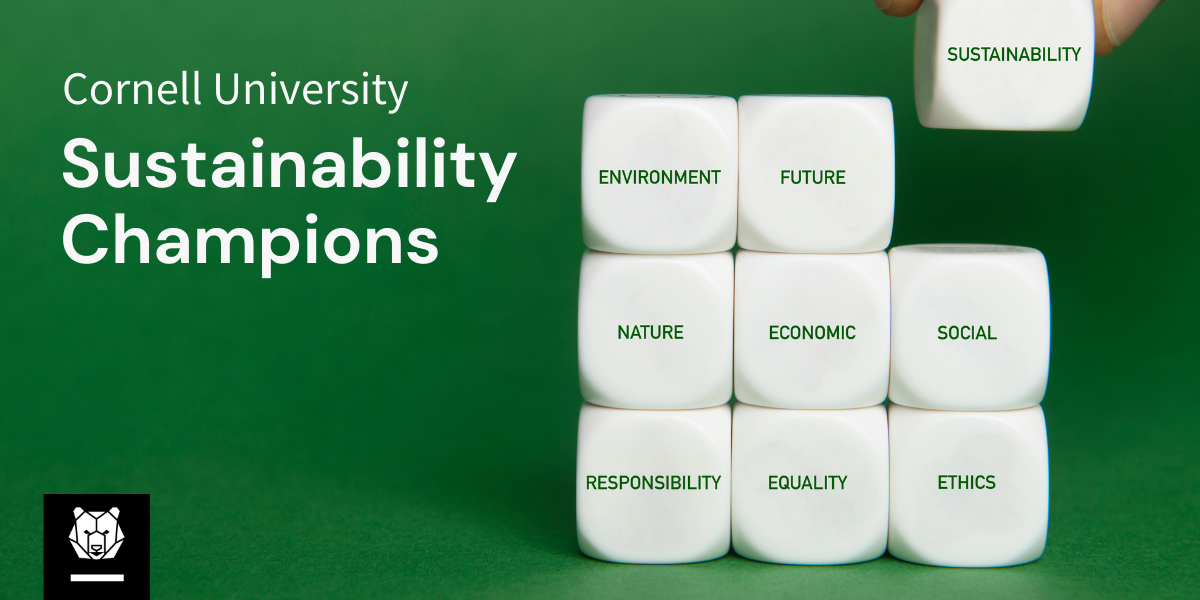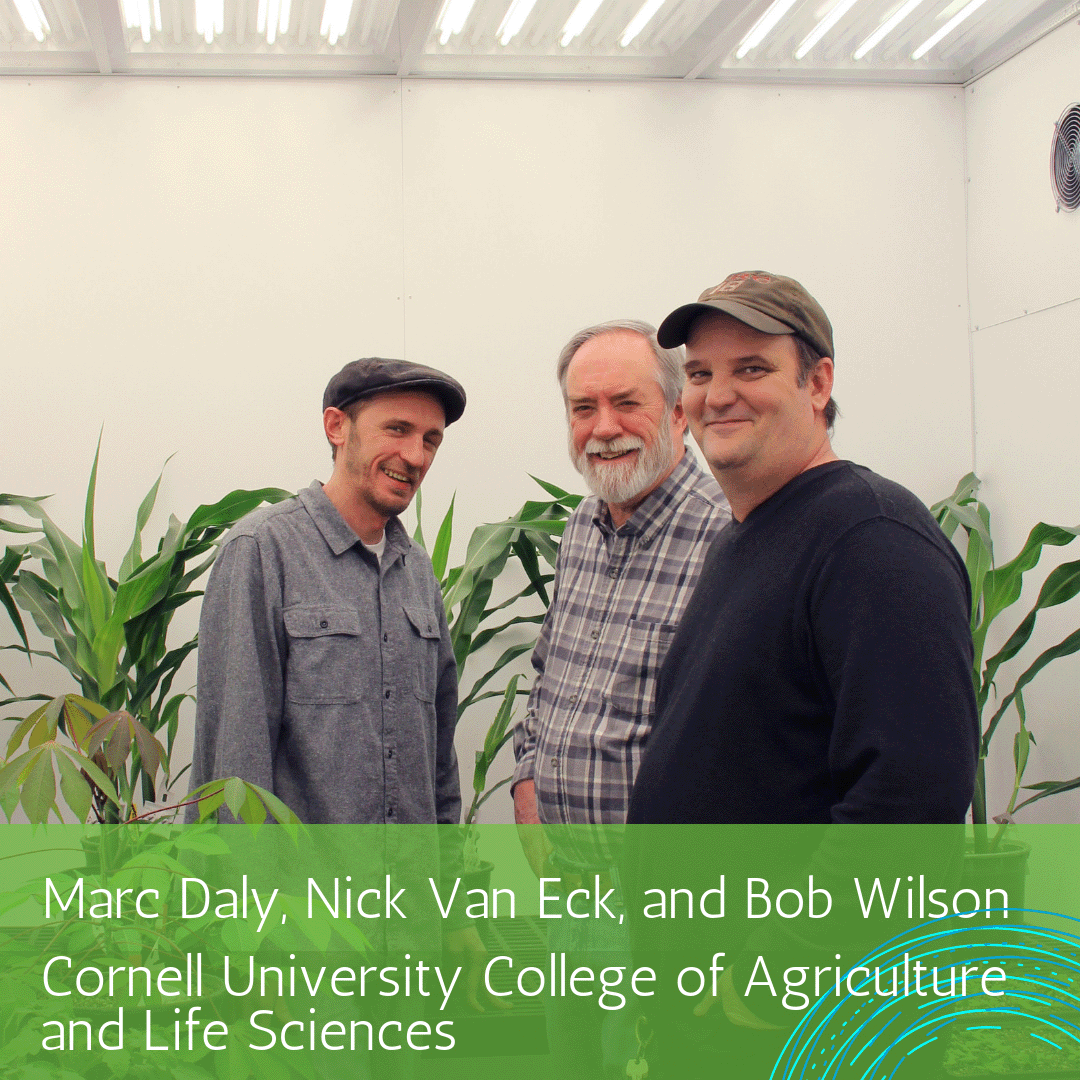Sustainability Champions
Do you know a coworker who always brings a reusable mug to every event? Piloted a waste reduction program? Included climate change in an educational event? Any faculty or staff member, at any level, can be recognized as a champion for creating a more sustainable campus and culture with actions big and small. This program is supported by the Campus Sustainability Office.
How to Nominate
-
Enter a short nomination in Cornell's Appreciation Portal
-
Nominations will be reviewed monthly. Each month, one employee will be selected to receive 50 points in celebration of their sustainability contributions on campus, and their recognizer will receive 15 points for highlighting their colleague’s actions. (Recognition portal points = cash and prizes!)
-
Any employee can nominate a colleague from any division or department
Questions? Contact us at sustainability@cornell.edu.
Fall 2021 Sustainability Champions
-
Madjabi Castrejon, Administrative Assistant / College of Human Ecology, Psychology
Reinvigorated the College of Human Ecology's Green Team during the transition back to campus and supported the launch of the CHE Closet.
-
Alisha Hill, Pharmacist / College of Veterinary Medicine, Cornell University Hospital for Animals
Advanced sustainability in the Cornell University Hospital for Animals Pharmacy by advocating for changes to disposable bags.
-
Meg Cole, Program Administrator / Cornell Population Center, Policy Analysis and Management
Coordinated the College of Human Ecology's coat drive and frequently assists with CHE Green Team events.
-
Gail Phillips, Program Associate / Cornell Atkinson Center for Sustainability, Strategic Partnerships
Inspired coworkers to be more sustainable and suggested solutions to address persistent litter issues in Cascadilla Gorge.
Joey Gates, Administrative Assistant for Clinical Programs at the Cornell Law School
Recognized on February 2020
Gates founded Dish Truck to cut down on 'mountains and mountains of garbage'. Dish Truck does this by providing and cleaning serviceware items before and after events.
Since starting in 2015, the program has avoided over 100,000 disposable dishes and 60 gallons of food scraps from going to the landfill. This results in a reduction of source point pollution, and addresses local and statewide environmental, economic and environmental justice concerns. Says Gates, “By simply replacing disposables with reusable dishes, we bring the responsibility for our by-products back into the community".She was also recognized for serving as an Earth Day Coordinator and for supporting sustainability efforts on campus. A quote from the nomination form for Joey:
Joey has been actively involved with university sustainability committees and working groups and has helped get sustainability on the agenda since 2004. She is working hard to bring sustainable practices to events run by Cornell and understands the complexity of the issue and the complexity of working with and within large organizations. She has saved her own unit money by getting them to adopt sustainable practices during the 2008 economic downturn.
Marc Daly, Equipment Tech IV
Nick Van Eck, Research Support Spec II
Bob Wilson, Equipment Tech IV
September 2019 Staff Champions
"Nick Van Eck, Marc Daly and Bob Wilson showed great initiative to design and build from scratch three growth chamber prototypes that are cheaper, easier to maintain, and that use substantially less energy than conventional chambers. These prototypes take advantage of Cornell’s campus chilled water system.
The chilled water, along with the building heating water, combine to regulate the chamber temperature. That system eliminates the need for refrigerants and compressors. Researchers particularly appreciate how well these new chambers precisely regulate temperatures and how quietly they run – reducing the typical high noise pollution in chamber rooms.
After years of maintaining and fixing 125+ conventional chambers on campus, the team came up with a vision for chambers that would have a streamlined mechanical design and a much smaller carbon footprint. In 2014, they completed their first prototype with 10 square feet of space – all while keeping up with their regular job duties.
Their reach-in chamber has been running flawlessly ever since, and it uses an astonishing 85% less electricity than one of Cornell’s conventional chambers of the same size.
Two years ago, the growth chamber crew completed a second prototype, a larger walk-in chamber with 100 square feet, using the same straightforward engineering and design savvy. This time, they installed the latest in LED lighting and are seeing even more in energy savings than if they used conventional lighting.
Last year, they finished a third prototype, a larger reach-in prototype with 30 square feet of space and LED lighting. The team is currently working on retrofitting some of the older chambers, replacing fluorescent lights with LEDs.
Current growth chambers on campus consume between $1,800 and $11,500 of electricity a year – per chamber! The success of these staff-led prototypes now paves the way for wholesale replacements of current chambers that will have a lasting positive sustainability impact for Cornell and for plant research that relies on access to robust, reliable chambers.
For years Nick, Marc and Bob, working in partnership with Charles Duffy, Andy Leed and others, have been true champions of sustainability, and have spearheaded various other projects that make a difference. For example, they built a light bulb recycling station, where old fluorescent lamps from plant growth facilities around campus can be properly sorted and labeled for recycling. To raise awareness among chamber users, they have posted energy consumption signs on every single growth chamber, with instructions on how to reduce their energy use. They have proactively retrofitted many of our current chambers to remove and replace the ozone-damaging R22 refrigerant.

Sue Brightly, Communications Marketing Specialist, Division of Human Resources
April 2019
Nomination text: Sue shared with us that she’s making a determined effort to avoid single-use (disposable) utensils. She was inspired by her supervisor, Dianna Marsh, who uses a set of bamboo utensils at work. Sue began crocheting fun “utensil cozies” for her upcycled garage-sale cutlery, wrapped in a reusable cotton napkin. She’s made several as gifts and is making more to keep in the car, desk, and to share. Sue also uses refillable mugs at work, and is finding other ways to cut back on plastic, like using shampoo bars and bringing reusable containers for leftovers when dining out. Sue says, “these may just be little things, but if lots of people get in the habit of acting with sustainability in mind, and even having some fun with it, we can make a difference!”
Sue's Supervisor Ashley Fazio writes:
"...Sue wholeheartedly embraces the concepts of sustainability and has deep care and compassion for the environment and people around her. [S]he is proactive in the sharing of campus sustainability resources and information – not simply because it’s part of her job, but because they are truly meaningful to her. I would not be surprised at all to hear that she was integrating [the Campus Sustainability Office] sustainability recipes into every aspect of her life. She in active in creating a welcoming and compassionate workplace for our team members, and also supports colleagues in their emotional and overall wellbeing through her willingness to step up and help out whenever she’s needed. She taught herself how to crochet! And that spooncozy is just one of her amazing creations. She’s even offered to make them for teammates..."
Thank you Sue for all you do!

Lanny Joyce, P.E.,CEM, Director of Utilities & Energy Management, Facilities and Campus Services
April 2018
Nomination Text: Lanny along with the Director of Utilities Distribution and Energy Management, Mark Howe, have done a tremendous job leading the campus with their engineering expertise in reducing the demand for energy use by Cornell's facilities. Lanny has especially been active in leading efforts to supply the campus with renewable, sustainable energy sources. Cornell has many old buildings and systems that are inefficient by today's standards. New research facilities, such as Weill Hall, use a large quantity of energy because they are research facilities that require much heating and cooling, very clean environments, large amounts of electricity and huge amounts of ventilation. Yet, Lanny and his team have steered these facilities to being as energy-efficient as possible while still maintaining their function as world-class educational and research facilities. To keep the facilities in “top tune”, Lanny suggested and lead the creation of Cornell’s innovative Energy Conservation Controls Team to continuously optimize and improve building energy systems. Since 2000, Cornell’s campus has grown over 20% in size yet the budgeted 2018 fiscal year energy use by the buildings will be slightly decreased. That accomplishment is the doing of Lanny, Mark, staff, consultants, and contractors.
Both Lanny and Mark have a positive, sustainable impact that reaches beyond Cornell and into our community. Lanny has long been a frequent presenter for Cornell's energy plans and systems - including Lake Source Cooling (Lanny was Cornell's Project Manager), the combined heat and power plant (Lanny was Cornell’s Project Director), energy conservation, energy management, high performance buildings, controls, and most recently present and future renewable energy systems and climate neutrality planning - to professional and civic organizations.
Each year, Lanny and Mark spread the word of and details about the Cornell University Energy Conservation Initiative to student classes and to a group of local/regional engineers (ASHRAE) through an on campus tour and technical presentation, and in doing so, helped transfer their knowledge and experience in the technology to other engineers. This is yet another example of Cornell as a world-class leader and a leader in our community.
Lanny defines the term "professional". He is technically skilled, highly ethical, and a good community leader.
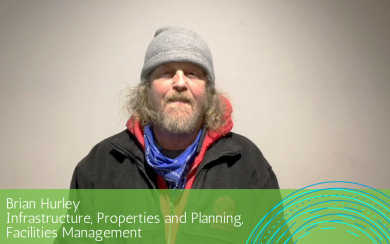
Brian Hurley, Infrastructure, Properties And Planning, Facilities Management, Building Care
February 2018
Nomination Text: Brian Hurley was first identified as a sustainability champion in a 2013 nomination for the Cornell University Partners in Sustainability Award (CUPSA), and his efforts are going strong five years later! His team describes Brian as "... an individual who has made Sustainability a way of life. He is always looking for innovative ways we can recycle and re-use our resources available. He has contributed by creating awareness, and has continued to educate the staff, about why sustainability is so important. He engages everyone on sustainability and has become a catalyst for change by educating all why change is needed. His impact has become a reality for the staff and students, and we are all better off because of his commitment to sustainability. He often shares with others the many ideas he has on how we can be better at recycling our resources. He presented a report to Cornell on how they can improve on sustainability efforts here at Cornell. I know firsthand that we are all better off because of Brian's efforts..."
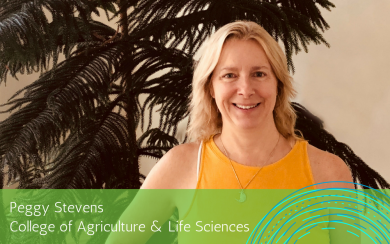
Peggy Stevens, Department of Biological and Environmental Engineering, Cornell University CALS Administrative Assistant
January 2018
Nomination Text: In 2013, Peggy's manager was inspired to take sustainable actions in the workplace after attending Cornell's Management Academy Sustainability Training and knew Peggy was the person to lead sustainability actions for their team. Peggy took on the challenge and has been a champion for sustainability ever since. It has become Peggy’s mission to make the Department of Biological and Environmental Engineering (BEE) more sustainable in every way, through example and concrete projects.
She has engaged faculty, staff and students for input and proposed many ways to increase office sustainability practices. Her anonymous nominee describes Peggy’s sustainability contributions as follows “… I cannot think of a more proactive sustainability crusader on Cornell’s campus than Ms. Peggy Stevens. She’s worked hard to green her own life, e.g., trading in her gas guzzler for a hybrid and now she is proactively greening Riley Robb Hall. Her enviro-activism is omnipresent and fully engaged... Because of Peggy, we now have compost and plastic bag containers beside our trash and recyclable bins. She takes responsibility for emptying these extra containers and making sure the material is properly delivered to the appropriate handlers. Last year she helped arrange to have Cornell’s Take Back the Tap student group (TBTTs) supply water coolers for the Biological and Environmental Engineering commencement to avoid using bottled water to quench the thirst of the participants. Next time you are in Riley Robb Hall, notice the signs demonizing bottled water and encouraging you to use the drinking fountain next to the vending machines… that’s Peggy. For Earth Day 2013 she organized a seed-exchange and compost workshop; I’m looking forward to whatever she has planned for next year. Peggy’s recently been asked to take her green-energy beyond the walls of Riley Robb Hall as part of the committee responsible for “Greening” Cornell University events….”
Email energy-sustinability@cornell.edu or call 607-255-6375 to request "Flip the Switch" stickers. Peggy has also organized office staff into a group to achieve a Green Office Certification; she was also a “Green Ambassador” to her upstairs neighbors the Cornell Local Roads Program and helped them become Green Office Certified. As part of the Green Office program her office now uses Cozy Toes foot heaters (Cozy Toes are available in eShop from Vasco. They pay for itself in ~2 months by reducing the amount of electricity used by space heaters by 95%). All of our space heaters are now gone, and we have “Flip the Switch” stickers on all our light switches.
The building is now filled with live green plants to help the air quality that Peggy and a co-worker care for and keep watered. BEE graduation celebration strives for zero-waste and finally, Peggy goes around the building shutting off lights and turning off air conditioners that are left on.
Peggy says “Basically, there has been a culture shift within the building where it is expected that everyone will recycle and compost. This spreads from the building into everyone’s daily lives – a real grassroots structure.”
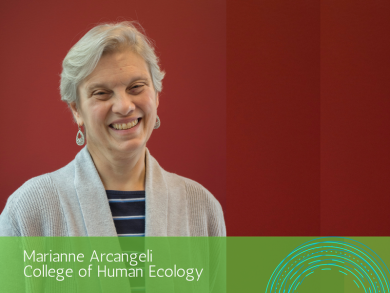
Marianne Arcangeli, College of Human Ecology Administrative Assistant & Student Services Representative
December 2017
Marianne coordinated the Winter Blues and Greens cooking demonstrations for the College of Human Ecology's Green Ambassadors this year. The series of five demonstrations and tastings were offered to faculty, staff, and students of the College of Human Ecology. The demonstrations and tastings, held in the Department of Nutritional Science's cooking lab, focused on sustainable cooking practices and healthy eating. Participants learned healthy and sustainable cooking techniques and recipes. Marianne was responsible for finding the presenters, advertising the series, purchasing the food if requested, and supplying the attendees with the recipes, if requested.
Marianne also organized CHE's presentation on local CSAs that deliver to CHE. Despite a very busy job, which has included covering for a co-worker who has been out with illness, Marianne has been a cheerful and active part of CHE's Green Ambassadors.
Marianne’s deep commitment to sustainability issues is inspired by her love for her granddaughters, and by a deep and abiding respect for a past Human Ecology SUPER Green team member, Angela Stedwell. Check out her Twitter where she covers sustainability content: https://twitter.com/MarianneArc

